Seventh Sword
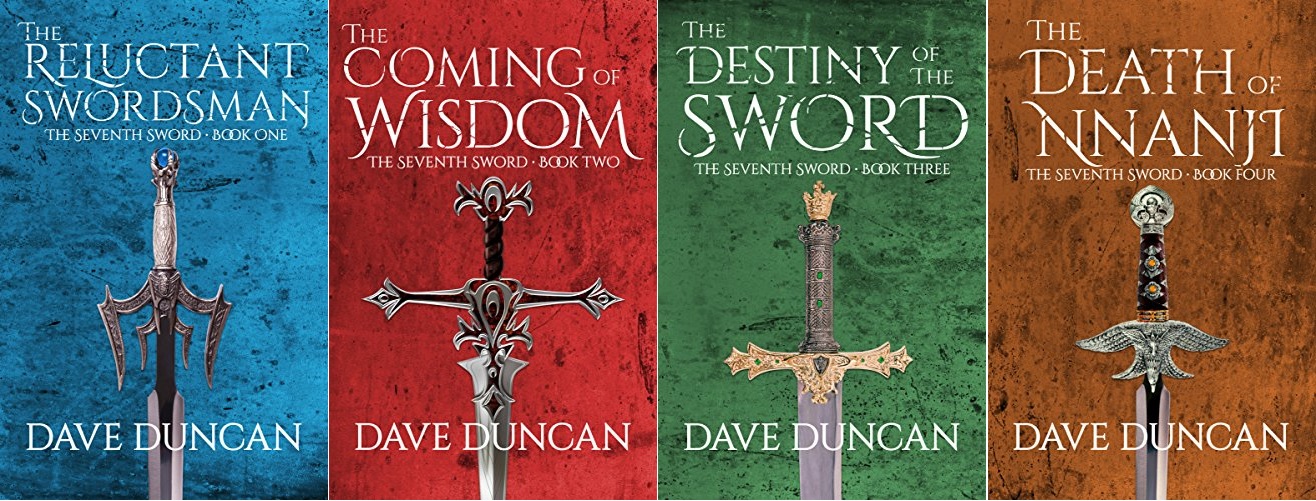
Wallie Smith, a chemical engineer from Earth is dying. Elsewhere in the Universe, Shonsu, a barbarian master swordsman, is physically gifted but intellectually lacking for the task at hand, so his Goddess decides to transplant Wallie’s soul into Shonsu’s body. Wallie must quickly come to terms with his own death, the sudden lack of technology, the rigid conventions of his new culture, and the unceasing pressure to defend his status as Master Swordsman. As if that wasn’t enough, he also needs to comply with the Goddess’ wishes and thwart corruption that threatens to undermine the local theocracy, benevolent of course, and bestow a form of tyranny on her worshippers.
The world in which Wallie now lives features a strict hierarchy, in theory the priests of the Goddess are in charge, but their authority is policed by the swordsmen, with various other guilds working below these. Within each guild there are seven levels of attainment, progression through the levels is achieved by mastery of sutras, rote learnt proverbs which must then be exhibited in behaviour. In any particular setting the highest rank individual will be in charge, in the event of multiple individuals at the same level being in place, only one can assume authority and in the case of the swordsmen that authority is derived through individual combat. Shonsu is a level seven swordsman and therefore a potential threat to the authority of the local Reeve, who just happens to be part of the corruption and distinctly unhappy about the presence of another level seven.
The author does an incredible job of creating a believable world and remarkably intricate social structure which, while vastly different to our own, make sense in and of themselves. The main characters are well developed and multi-dimensional. The narrative covers two main arcs, the quest itself and the challenges to Wallie’s morals and sensibilities. My one major qualm lies in the somewhat misogynistic treatment of the female characters, in keeping with the culture of Wallie’s new home they are very much treated as objects of ornamentation or gratification. This does improve markedly as the series expands but can feel very anachronistic to begin with. If you can overlook this aspect, the rest of the series is a very enjoyable, far reaching adventure. I found myself fully engaged with the story and I have yet to read a better example of the fish out of water style of fantasy.
- The Reluctant Swordsman (1988) – Amazon – Book Depository
- The Coming of Wisdom (1988) – Amazon – Book Depository
- The Destiny of the Sword (1988) – Amazon – Book Depository
- The Death of Nnanji (2012) – Amazon – Book Depository
A Man of His Word
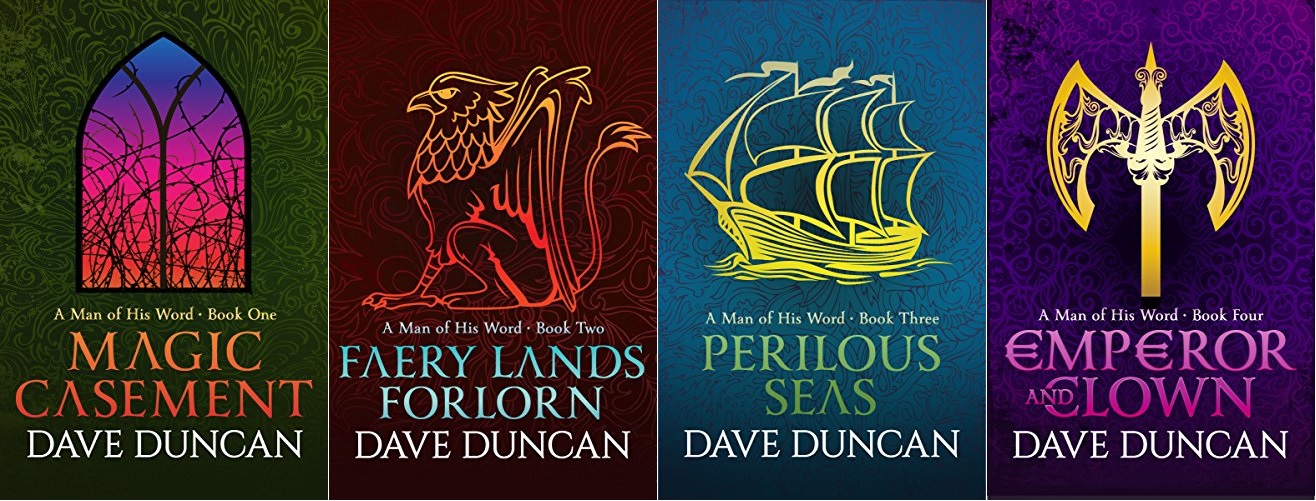
Pandemia is a world populated by all the major fantasy races, Elves, Dwarves, Goblins, Trolls, Fairies, Mer folk, Gnomes, Djinn, Fawns, and perhaps most importantly for this particular story, Jotnar (Viking types) and Imps. In Pandemia words of power bestow abilities onto their owners. One word amplifies an already present talent to genius levels. Two words creates an adept, someone who can successfully master any talent. Three words makes a mage and with it the power to perform temporary magic. Knowledge of four words creates a sorcerer, an immensely powerful being capable of changing reality. There’s a few other rules, some words are more powerful than others, natural talent allows an individual to better exploit the power within a word, and words can be shared which shares out the power of the word amongst the owners, the more owners of a word the weaker it’s effect on the individual owners. Words of power are highly prized and ruthlessly collected, to own just one or two can be very dangerous, owners of three or even four may come looking to harvest additional power, either by gaining the word for themselves or by gaining control of the individual.
Inosolan is the charming, intelligent, and independent, Princess of Krasnegar, a tiny kingdom in the far north polar region of Pandemia. Tiny but not insignificant, unusually it is the only place in Pandemia where Imps and Jotnar co-exist (somewhat) peacefully. The Kingdom is also strategically important as a neutral trading port for many goods. Krasnegar has been ruled by a line of Kings since its formation, a situation mostly tolerated by both Imps and Jotnar each, as the alternative would be control of the port for the other. Princess Inosolan is an only child though and approaching a suitable age for marriage, a poorly chosen match could lead to a war. The time has come for Inosolan to leave Krasnegar to attend a finishing school in the Impire (home of the Imps, obvs).
Rap is Inosolan’s childhood friend, an orphan and a stable boy in the castle at Krasnegar, as they’ve grown up he realised that his feelings extend beyond friendship, he also recognised that his lowly status will prevent him from ever expecting anything in return. As Inosolan is leaving, Rap is coming to terms with his own transition from child to adult and attempting to discover his place in the world. Aside from the standard growing pains, Rap begins to exhibit some unusual abilities, a development that Rap is distinctly uncomfortable with.
Then the King becomes ill, like sharks, certain undesirable players begin to circle Krasnegar. Not only is there the chance to gain control of the important town, but there have long been rumours that the King possesses a word of power, something his daughter will inherit along with the Kingdom, both of which her eventual husband could reasonably be expected to gain control of.
A Man of His Word (AMOHW) is a far cry from the current trend for gritty, grimdark fantasy, as per Joe Abercrombie or George RR Martin. This series romanticises a much more upbeat, old fashioned, good vs. evil brand of fantasy. You could be forgiven for reading the synopsis above, ticking off the cliches – Standard fantasy races and stereotypes? Tick; A beautiful but impetuous Princess? Tick; A lowly orphan with unusual powers? Tick; and writing the series off as just another Tolkien clone. From a purely cynical viewpoint you’d be correct, but the strength of this series is not in the development of new tropes, it is very much in the implementation of the existing ones.
The author has created a strong collection of central characters, while they don’t have grimdark levels of ambiguous inner machinations, they do all exhibit enough flaws and weaknesses to become fully fleshed, believable people. Pandemia makes sense as a world, complete with political and cultural histories. The various races are not fully fledged versions, rather they seem to be humans with traits borrowed from the classical fantasy races: Elves have pointy ears and artistic tendencies; Dwarves are short, grumpy and love precious metals; Goblins, green tinge and poor house guests; Jotnar, rape, pillage, quaff beer, repeat. Each race interacts with others in the way you’d expect, e.g. Dwarves and Elves, not best buddies.
All of that is not to say there is no ingenuity on display, the magic system is unique and very well developed, the rules governing its use are applied consistently. And having just skimmed a few parts of the series to help write this review, I realised that certain aspects of the magic system, which don’t become material until the end of the follow on series, A Handful of Men, are present in the first few chapters of The Magic Casement. While I found this surprising, it just reaffirmed the strength of the system and the skill of the author.
I unapologetically love this series, I love the characters, I love the setting and I love the story. If you held a gun to my head and forced me to pick a fault in this series, then I would probably tell you that the adventure takes a while to get going, probably half of the first book. But I’d then argue that there is no fluff or waste, just a highly skilled author building solid foundations that pay off over the rest of the series. Half a book of scene setting for seven and a half books of high-quality storytelling feels like a fair compromise to me.
- Magic Casement (1990) – Amazon – Book Depository
- Faery Lands Forlorn (1991) – Amazon – Book Depository
- Perilous Seas (1991) – Amazon – Book Depository
- Emperor and Clown (1992) – Amazon – Book Depository
Handful of Men
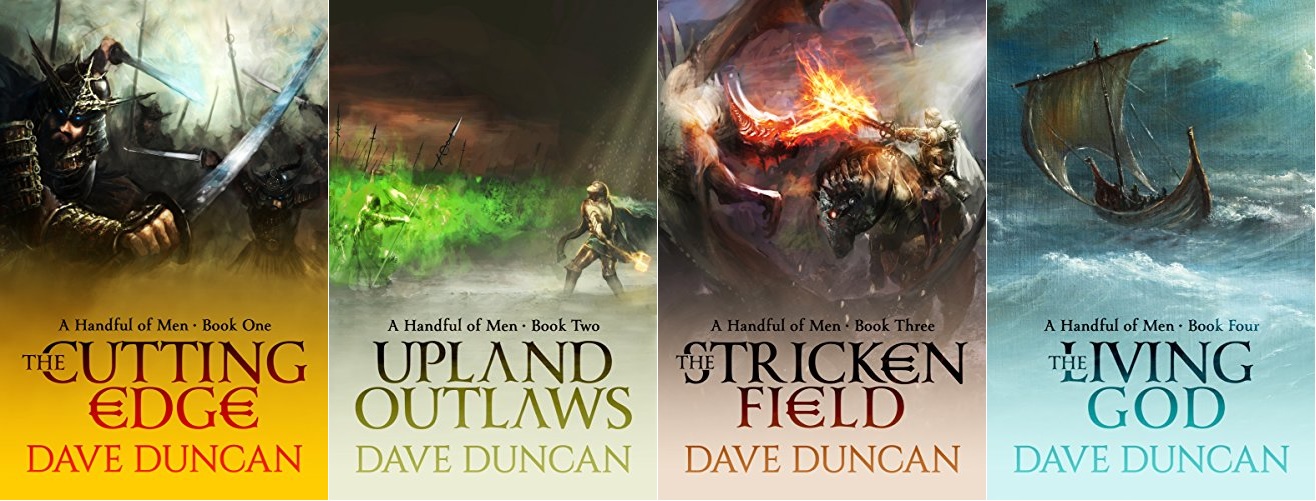
See above, this series is set some 15-20 years after the events of A Man of His Word, to say any more would be to spoil the outcome of that series.
- The Cutting Edge (1992) – Amazon – Book Depository
- Upland Outlaws (1993) – Amazon – Book Depository
- The Stricken Field (1993) – Amazon – Book Depository
- The Living God (1994) – Amazon – Book Depository
Omar

- Reaver Road (1992) – Amazon – Book Depository
- The Hunter’s Haunt (1995) – Amazon – Book Depository
The Years of Longdirk

- Demon Sword (1995) – Amazon – Book Depository
- Demon Rider (1997) – Amazon – Book Depository
- Demon Knight (1998) – Amazon – Book Depository
Great Game

- Past Imperative (1995) – Amazon – Book Depository
- Present Tense (1996) – Amazon – Book Depository
- Future Indefinite (1997) – Amazon – Book Depository
King’s Blades

- The Gilded Chain (1998) – Amazon – Book Depository
- The Monster War (originally released as King’s Daggers Trilogy) (1999-2001) – Amazon – Book Depository
- Lord of the Fire Lands (1999) – Amazon – Book Depository
- Sky of Swords (2000) – Amazon – Book Depository
- Paragon Lost (2002) – Amazon – Book Depository
- Impossible Odds (2003) – Amazon – Book Depository
- The Jaguar Knights (2004) – Amazon – Book Depository
- One Velvet Glove (2017) – Amazon – Book Depository
Dodec
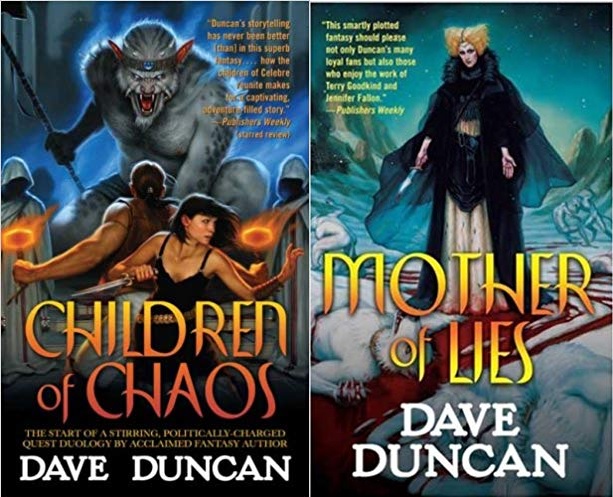
The Alchemist
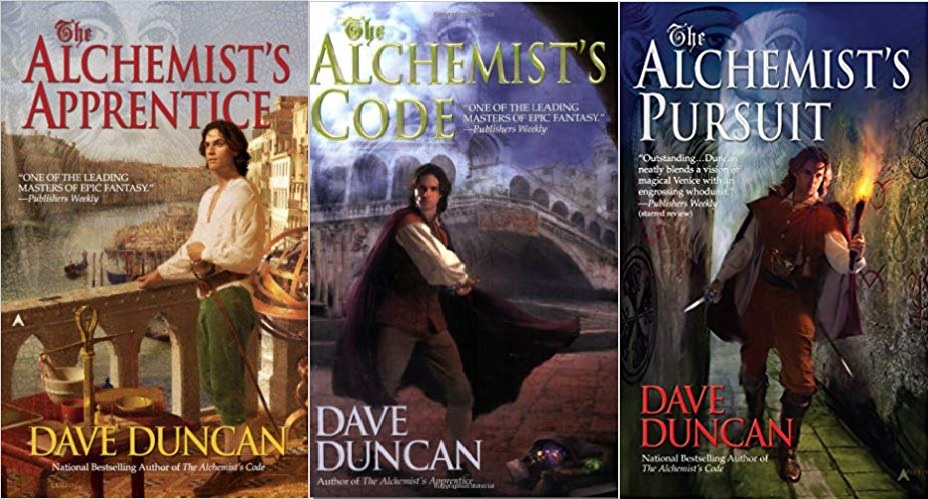
- The Alchemist’s Apprentice (2007) – Amazon – Book Depository
- The Alchemist’s Code (2008) – Amazon – Book Depository
- The Alchemist’s Pursuit (2009) – Amazon – Book Depository
Brothers Magus
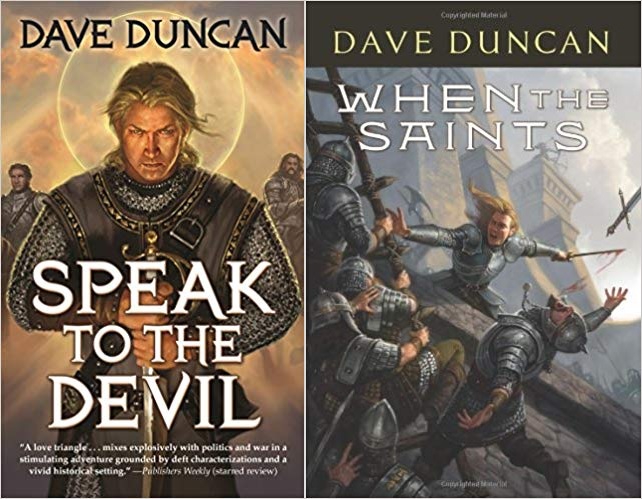
- Speak to the Devil (2010) – Amazon – Book Depository
- When the Saints (2011) – Amazon – Book Depository
- Speaker and the Saints (coming 2019) – Amazon – Book Depository
Starfolk
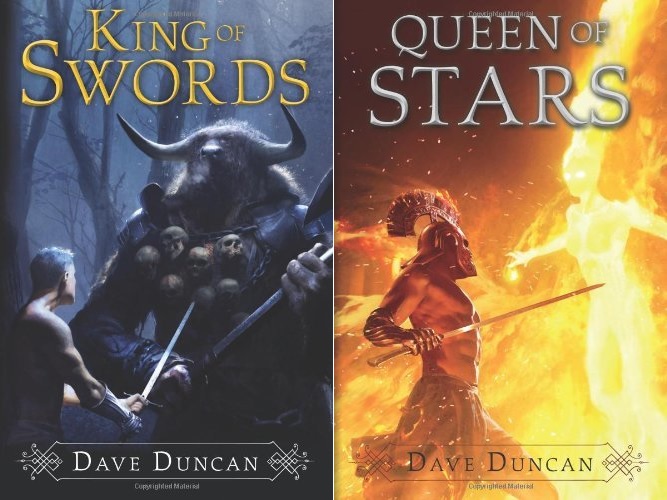
- King of Swords (2013) – Amazon – Book Depository
- Queen of Stars (2014) – Amazon – Book Depository
Enchanter General
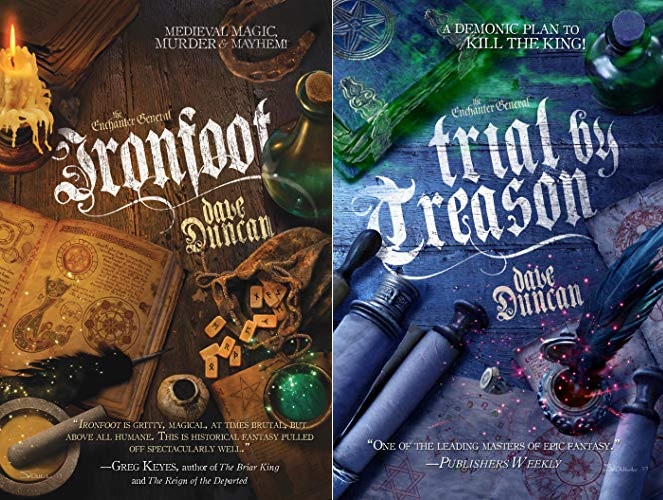
- Ironfoot (2017) – Amazon – Book Depository
- Trial by Treason (2018) – Amazon – Book Depository
- Merlin Redux (coming 2019) – Amazon – Book Depository
Other Works
- Portal of a Thousand Words (2017) – Amazon – Book Depository
- Pillar of Darkness (2019) – Amazon – Book Depository